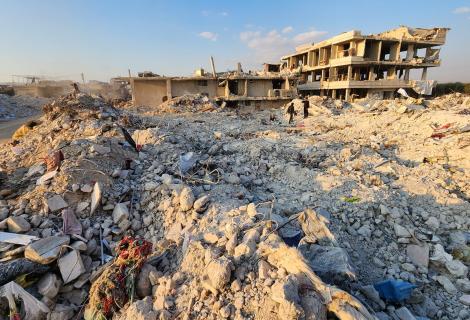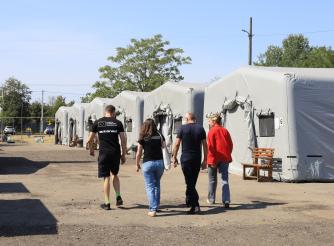International Donors’ Conference in support of the people in Turkey and Syria

Swedish Council Presidency, European Commission and Donors March 20 Brussels meeting
As the Syrian crisis marks its twelfth year of conflict, a grim future for Syrians persists, amidst a protracted crisis characterized with recurrent displacement, hostilities, social instability, uncertainty, violence, and hopelessness. At a time when affected people are already pushed to the brink, earthquakes that struck on February 6, added further layers of suffering, caused critical infrastructural and domestic damages, killing and injuring thousands of people, and resulting in new waves of displacements.
Despite these challenges, women and young people in Syria continue to demonstrate incredible resilience and strength. Syrian women-led and women’s rights organizations have mobilized to address gendered impacts of the earthquake and specific assistance and protection needs of women and girls. historically Syrian young people have been holding the forte in the forgotten crise and they have been first responders, but with inadequate resources. They are working to rebuild their communities and their lives in the face of overwhelming adversity. But they cannot do it alone.
Particularly in Northwest Syria, the epicenter of neglect, as well as in Türkiye, the response to the recent massive earthquakes was characterized by additional failures in coordination and timely support to local organisations that hindered the delivery of urgent and life-saving aid. In affected areas, people felt abandoned and neglected by those supposed to protect them, in the most desperate of times. Vulnerable population in northwest Syria, faced multiple displacements and now forced to displace again after the earthquake.
Requests to international donors
ActionAid Arab Region and its six partners in Syria had an exchange at the beginning of March on what was needed to have positive impact on the lives of those affected by the earthquake, particularly those most marginalized and at risk. They came out with five requests to international donors at the March 20 Brussels conference in support of the people of the people in Turkey and Syria.
1) Allocate new funding for earthquake relief outside of the existing Syria Humanitarian Response Plan.
" The funding that was made available is like a drop in the ocean” Partner in NW Syria (Violet)
The resources available for relief efforts are limited. It is of utmost importance that meeting needs of EQ affected people takes place without reallocating financial resources from pre-existent ones, the address the appalling situation for Syrians along the frontlines.
We are urging the international community through this upcoming Sweden-EU pledging conference to allocate new funding outside of the existing Humanitarian Response Plan funding, to ensure that the immediate and longer term needs of affected communities are met, without jeopardizing humanitarian response in other areas and sectors, especially that the Humanitarian Response Plan for Syria has been severely underfunded for the past years. In 2022, it received less than half (49%) of the funds appealed. For immediate needs, people require Food and NFIs especially those who lost their houses with the provision of water and sanitation facilities at the informal settlements. However, affected population are in dire need of income generating activities for their dignified and sustainable survival. These opportunities were already limited due to conflict zone and now they are non-existent.
2) Addressing longer term needs and causes of vulnerability require longer term and predictable funding.
“We need to upscale urgently needed humanitarian assistance, we need to think of long-term development programs that allow economic and social stability, and we need to bring peace building projects that foster social cohesion among IDPs, host communities and especially enable young people as agents for positive change.” Partner in NW Syria. (Violet)
Affected communities do not know where to settle in the long run. It will need significant support from the international community to help affected people build back better. Amidst the long-lasting effects of the disaster, longer term support is needed to promote resilience and sustainable recovery, by helping rebuild livelihoods, mitigate the significant impacts on physical and mental health, promoting early warning and disaster preparedness and response efforts.
Given the devastating effects of the earthquake, that struck an already disastrous situation, civil society organizations are urging donors to show commitment to the Triple Nexus framework for Humanitarian action, emphasizing on the need to complement Humanitarian response with Development and peace building efforts. As the emergency response transitions into the recovery phase, addressing the underlying causes of vulnerability through restoring livelihoods, allowing economic social and social stability is key. Particularly in fragile context of Northwest Syria right now, we need to bring comprehensive support that addresses the multifaced problems and intersectional vulnerabilities communities are facing.
So far, most of the response has been focused on community level, leaving vulnerable groups behind. We urge donors to support tailored and inclusive programs for all groups including marginalized, youth, women, PWD, elderly, by also including their voices and ensuring their participation. Leaving no one behind in humanitarian response requires a commitment to equity, inclusion, and human rights. It means recognizing and addressing the underlying causes of vulnerability and marginalization and working towards a more just and equitable society for all.
3) Provide quality and accessible funding for local actors and space at the table.
“It is important to highlight the need for increased funding and support for local actors, particularly women and youth-led organizations, to ensure a more effective and sustainable response in NW Syria.” Partner in Syria. (Space for Peace)
Sustainable recovery and resilience require the participation of affected communities, while promoting community engagement and participation of affected communities, and ownership in recovery efforts, such as through participatory planning processes and support for local and grassroot organizations. Failure to ensure timely delivery of aid by larger organizations, was overcome through locally led initiatives. Donors must ensure more quality finding is accessible to local actors, after they have proved reliance as first rapid responders, without bureaucratic restrictions.
Local civil society actors can represent the voices of the targeted communities and to be accountable to them, in particular women, youth and other marginalized groups, when it comes to priorities for recovery and long-term programming. They need to have a seat at the table in donor conferences or planning meetings and not only be invited to respond to an already set call for proposal with decided objectives.
4) Flexible and adequate funding for youth led responses must come with support for their duty of care.
“Youth-led organizations often have unique insights and perspectives that can contribute to more effective and sustainable humanitarian and development response” Partner in Syria (Freedom Jasmine)
The role of young people as first responders has been very critical in saving lives. On-the-ground youth responders and volunteers conducted rescue operations and vital support for those affected by the earthquake without adequate equipment and frequently with their bare hands and inadequate resources. They have also for twelve years key humanitarian and social actors to support those on need and risk in the forgotten crisis of Syria. Donors they have been first responders but with, and how it will be important to not only support them with flexible and adequate resources but also with duty of care as well as partnering them in finding a lasting solution to Syrian crisis.
5) Provide funding to address the immediate needs of women and girls as well as their agency and leadership.
“In order not to exclude the work of women's organizations led by women, we hope to allocate a percentage of the funds provided to these organizations.” Partner in Syria (Freedom Jasmine).
Long term and cumulative impacts of a decade long pattern of failure has resulted in a myriad of challenges and cumulative impacts, disproportionally affecting women and girls, reducing the availability and access to care and protection. Combined with reduced funding and feminist advocacy, the situation for women ang girls in affected areas remains precarious, as they experience significant stress, trauma, forcing them to turn to negative coping mechanisms as a way to cope. We call on you to take action to support women and girls, by providing funding for programs that address their immediate needs and the underlying causes of these negative coping mechanisms, critical to support the long-term recovery and well-being of women affected by crisis. It also means supporting efforts to ensure that women and young girls are able to participate in decision-making processes that affect their lives and their communities.


